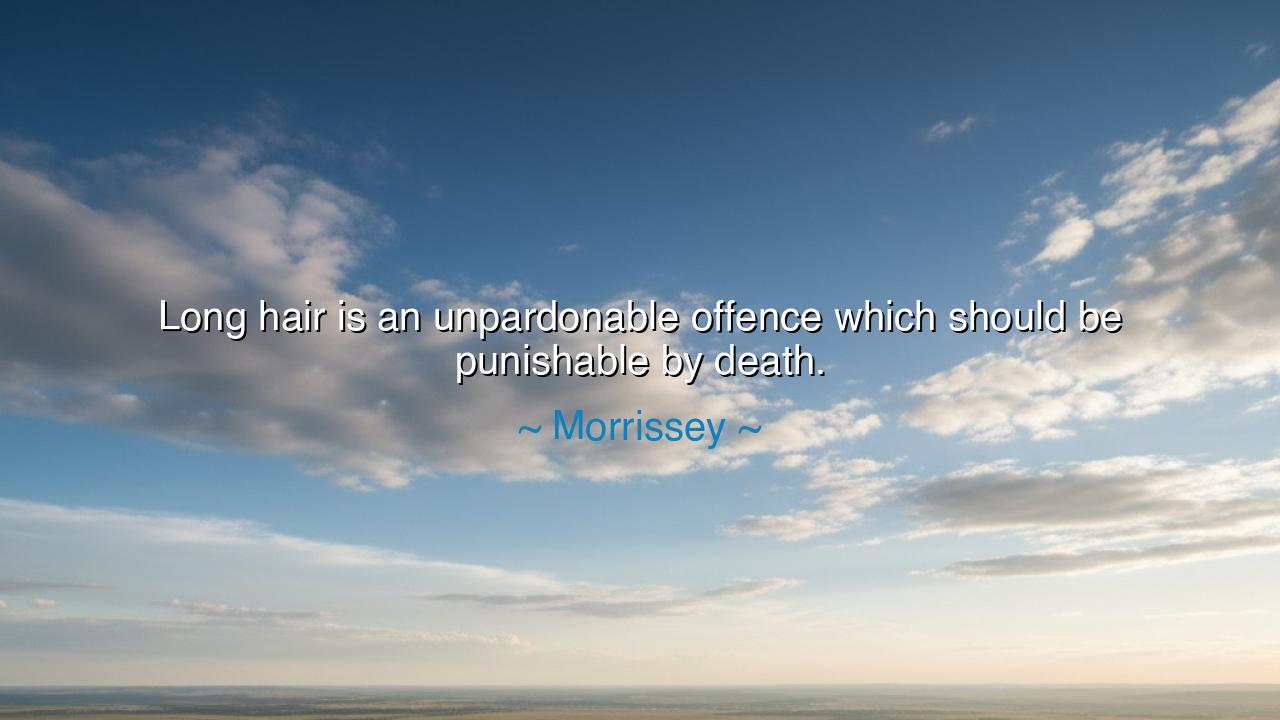
Long hair is an unpardonable offence which should be punishable






“Long hair is an unpardonable offence which should be punishable by death.” Thus declared Morrissey, the poet of irony and melancholy, whose tongue often wove sarcasm with truth and jest with lament. On the surface, his words strike with absurdity and hyperbole — how could the length of one’s hair ever be a crime, let alone one worthy of death? Yet beneath the theatrical sharpness of his wit lies something deeper, something ancient: a commentary on the strange cruelty of human judgment, and the way society invents punishments for what it does not understand. Morrissey’s line, though draped in humor, exposes the tragedy of conformity — the way people often condemn the harmless simply because it defies their sense of order.
In this quote, Morrissey wields exaggeration as his weapon. He mirrors the absurdity of a world that has too often treated difference as sin. His “unpardonable offence” is not truly about hair, but about individual expression — about those who dare to appear, think, or live outside the walls of convention. To call such a thing “punishable by death” is to mock the self-righteousness of societies that have, through history, persecuted those who do not conform to their narrow image of what is “proper.” The irony is sharp as a blade: he reveals the cruelty of judgment by parodying it, showing us how shallow moral outrage can disguise itself as virtue.
Throughout the ages, humanity has been guilty of this very folly. Consider the fate of Socrates, condemned to death not for crime, but for questioning the habits and assumptions of Athens. Or recall Galileo, whose ideas of the heavens were seen as blasphemy by those who could not bear to have their world disturbed. Like Morrissey’s imagined punishment for long hair, these real acts of persecution sprang from fear — the fear of seeing life through another lens, of acknowledging that truth and beauty may take unfamiliar forms. So when Morrissey speaks of death for an unpardonable “offence,” he laughs in the face of all who mistake control for morality, and uniformity for righteousness.
There is also, within his jest, a lament for the death of individuality. For Morrissey came of age in a world of post-war stiffness, where image and identity were shaped by expectation. His rebellion, wrapped in black humor, was a refusal to kneel before the dull altar of conformity. The “long hair” becomes a symbol — of youth, freedom, sensuality, defiance. It recalls the rebels of every age who have stood apart from the crowd: the prophets clothed in rags, the artists mocked by the masses, the thinkers scorned for daring to dream differently. By calling for their “death,” Morrissey reveals not his hatred of difference, but society’s — the mob’s tendency to destroy what it secretly envies.
History offers countless examples of this dynamic. When Joan of Arc appeared before her judges, they condemned not merely her actions, but her nonconformity — a woman who wore armor, spoke with conviction, and led men into battle. Her courage threatened the structure of the world around her, and so the world sought to burn her. So too, when artists and thinkers throughout time have dared to grow their “hair” — to stretch beyond the bounds of what is allowed — society has answered with ridicule, exile, or flame. Morrissey’s statement, then, is not the cruelty of the oppressor, but the mocking echo of their voice — a mirror held up to all who destroy beauty for the sake of order.
And yet, beyond its satire, there lies a quiet warning. For even in the modern age, when freedom is praised in word, conformity remains strong in spirit. The world still punishes those who are “different,” not with death by blade, but with death by isolation — the cold rejection of being deemed strange, ugly, or wrong. To live truthfully still requires courage; to wear one’s “long hair” proudly still risks scorn. Morrissey’s dark humor teaches us that the world’s intolerance, though absurd, is ever alive — and that the defense of individuality is a sacred and ongoing struggle.
Lesson: Let not the opinions of the fearful dictate your form or your freedom. If your heart commands you to stand apart, then do so boldly, even if the world mocks you for it. The “long hair” of your soul — your art, your ideas, your uniqueness — must not be shorn to please others. Remember that every age has crucified its prophets and mocked its poets, but time always vindicates the brave.
So remember the wisdom hidden beneath Morrissey’s irony: that society often condemns what it does not understand, and that rebellion, even when expressed in jest, is a sacred act of self-preservation. Stand firm in your difference, even when the crowd cries for uniformity. For the price of conformity is the death of the spirit, while the reward of authenticity — though it may bring mockery or exile — is freedom itself. Thus, let the “unpardonable offence” be yours, and wear it like a crown.






AAdministratorAdministrator
Welcome, honored guests. Please leave a comment, we will respond soon